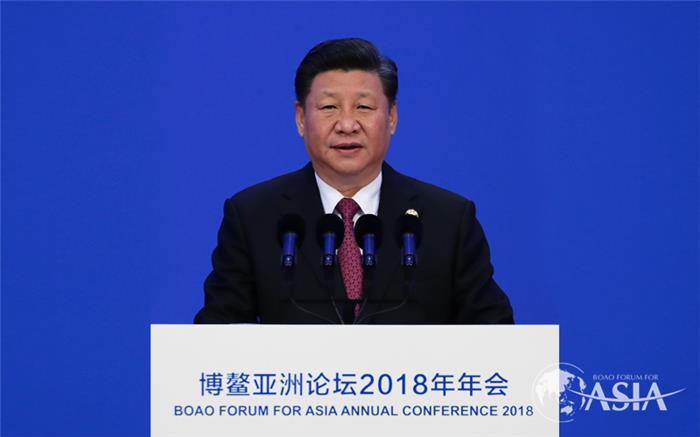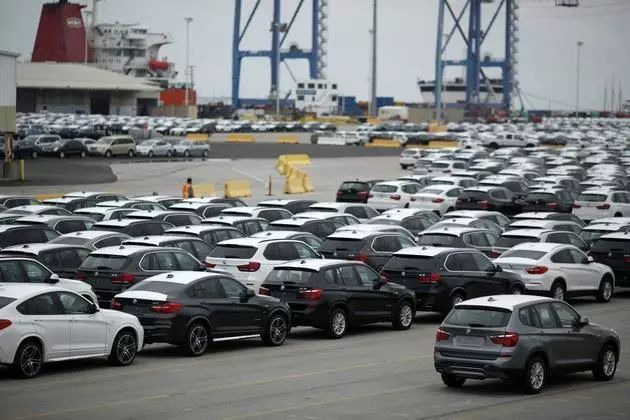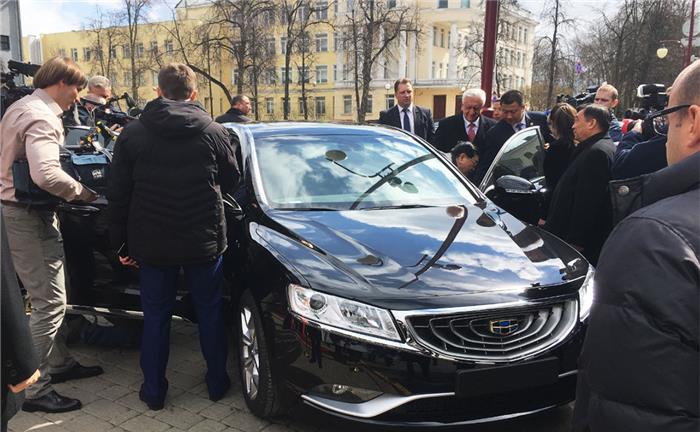It has been a long time since the auto industry opened up the restrictions on foreign-capital shares. In fact, the national level is also constantly studying and accelerating the pace of liberalization. On April 10th, at the opening ceremony of the 2018 annual meeting of the Boao Forum for Asia, Xi Jinping announced major initiatives to expand China's opening up, including China’s relaxation of foreign investment ratio restrictions, especially the restrictions on foreign investment in the auto industry. (Source: Boao Forum for Asia) One week later, the News Center of the National Development and Reform Commission revealed the time steps for the opening of automobiles and other manufacturing industries: the auto industry will implement a transitional period for different types of vehicles; in 2018, the ratio of foreign shares for special vehicles and new energy vehicles will be abolished; and foreign investment in commercial vehicles will be abolished in 2020. Shareholding limit; 2022, cancel the foreign capital ratio limit of passenger cars, and cancel the limit of no more than two joint ventures. Through the 5-year transition period, the auto industry will cancel all restrictions. This also means that foreign companies that have “floated†for more than two decades in the automotive industry will officially start to withdraw from the Chinese auto market than the red line. Five years later, it will become history. What are we worried about behind the 50% bottom line? Article 32 of Chapter 6 of the “Industrial Policy for the Automotive Industry†issued by the State Council in 1994: The proportion of Chinese-foreign equity joint ventures or cooperative enterprises that produce automobiles, motorcycles, and engine products shall not be less than 50% of the total, which is The earliest source of restrictions on the ratio of foreign-invested shares in the auto industry, in addition, this restriction was included in the Foreign Investment Industrial Catalogue of the Catalogue for the Guidance of Foreign Investment Industries (hereinafter referred to as “the Catalogueâ€). Every three to four years, the government department will revise the “Catalogue†once, and by the 2017 edition, the “Catalogue†is already the seventh revision. Each revision is based on the needs of economic development and opening to the outside world. Obviously, the restrictive measures concerning foreign investment in China in the Catalogue are becoming less and less, and the Chinese market is becoming more and more open, even if it is related to the automobile manufacturing industry. The limit of no more than 50% foreign shareholding ratio is still the bottom line that cannot be changed. Although it took only 40 years for reform and opening up, there has been a long history of calls for liberalization of foreign ownership ratios in the automobile manufacturing industry, but there are also concerns. What the industry is worried about is nothing but that “the liberalization of foreign-invested shares will inflict heavy losses on traditional state-owned enterprises and automakers of their own brands.†Dong Yang, secretary-general of the China National Automobile Association, has been opposed to the release of shares in the disputes of previous years. He believes: "The bottom line of the foreign side does not exceed 50 percent of the stock ratio can not be broken, the main reason is to protect Chinese brands." Car companies have also strongly opposed. On July 22, 2016, the China Association of Automobile Manufacturers once held a meeting in Beijing to discuss the “opening of joint venture sharesâ€. At the scene, the four major auto groups, including FAW Group, Dongfeng Group, Chang'an Group, and Beijing Automotive Group, jointly expressed their opposition to opening up the stock ratio. Since more than 30 years ago, foreign car companies have ventured to establish joint venture car companies in China. Today, the Chinese market has become the main driving force for the profitability of foreign car companies. The joint venture car companies have become star stars in the historical flood of the Chinese automobile industry. However, after more than 30 years of “market-for-technology,†China has always been passive in terms of core technologies and core components. Therefore, opponents claim that the liberalization of foreign-capital shares may harm Chinese interests in joint ventures. huge. Those who hold opposing opinions on liberalizing foreign shares also believe that China has no brand, no network, no products, only one factory, and only half of the property rights in the joint-venture car companies, and it is unpredictable to open up the unfavorable stock ratios. For self-owned brands, once they are released, the competitiveness of foreign brands in the Chinese market is beyond imagination, and there is huge room for price cuts. The suppression effect of independent models will be immediate, so from the perspective of protecting the strength of the local automobile industry, the joint venture shares It may be longer than the process of liberalization, so as to provide opportunities for independent brands to become stronger and bigger. On the other hand, foreign automakers have been deep-growing in overseas markets for many years, while Chinese automakers only have a Chinese market, and the strength and strength of “going global†are not yet fully realized. Therefore, liberalizing the share ratio may cause Chinese auto companies to lose only Counterattack opportunities. In particular, the domestic new energy automotive industry has only met with good results. Faced with the competition faced by veteran car companies overseas, whether or not they can parry is still a question mark. "Release" is the trend Releasing the ratio of foreign-invested shares in the auto manufacturing industry will impose severe pressure on the autonomous auto industry in the short term, but the Chinese auto industry that has experienced “entry into the WTO†proves that only an open environment can make the national industry more competitive. China's formal accession to the WTO at the end of 2001 meant that China’s import auto tariffs had been significantly reduced and various restrictions had been lifted. At that time, the Chinese automobile industry faced a more severe market environment than it is now. In 2000, the annual production and sales volume of Chinese automobiles was only 2 million, and the market share of self-owned brand cars was less than 15%. At that time, domestic independent car enterprises had no independent innovation strength. After nearly two decades of beatings, the Chinese automobile industry has become an important pillar industry of the national economy. The scale of production and sales has exceeded 28 million, and has ranked first in the world for nine consecutive years. As the Development and Reform Commission pointed out when answering a reporter’s question on the formulation of a new negative list of foreign investment and manufacturing openness, the opening up of manufacturing industry is the earliest field in China’s opening up, and it is also the area where market competition is the most complete. The practice of reform and opening up in the past 40 years has proven that only on the basis of certain development can we fully stimulate market vitality. Only openness can force innovation, and only openness can gather resources at home and abroad. At present, China's manufacturing industry is basically open, and the direction for further opening up is very clear. It is to achieve full-scale opening up. The biggest enemy is himself Concerns about liberalizing the ratio of foreign-invested shares may be the normal response under long-term policy protection conditions. Although it is only a window period of five years before the time for full opening is achieved, pressure is on course, but there is no need to worry too much. Secretary-General Cui Dongshu said: "Learning stocks ratio is something after 2022, and it should have no effect at present." This view coincides with the attitude of foreign car manufacturers. According to reports, German and American car manufacturers are China welcomes the relaxation of restrictions and repeatedly stated that it will not give up its respective Chinese partners. VW has said that it will study whether the latest moves in China will bring new options, but the company’s joint venture will not be affected. General Motors It means that the success of its Chinese market will benefit from its Chinese partners, and will continue to maintain good cooperation with its partners in the future. Therefore, the impact of the opening of foreign-capital stocks over the short-term may not be reflected. In addition, Cui Dongshu stated that the liberalization of the number of joint venture stocks will be a normal phenomenon for new energy joint ventures such as Jianghuai VW, and will also bring more opportunities to other companies. The old joint venture will face new joint ventures. The pressure brought by the business may be a chance. Compared with “the wolf is comingâ€, it is even more “horrific†that self-owned brand cars are still asleep in the hotbed of policy protection without knowing themselves. In recent years, the Chinese auto market has accelerated its expansion and the scale of joint ventures has grown rapidly, due to Chinese companies can only rely on products introduced by foreign joint ventures to have a certain market share, thereby satisfying their immediate interests, losing their motivation to digest and absorb imported technology, and causing a serious shortage of independent innovation capabilities. When the ratio limit is abolished, how to survive in this market will be a new problem faced by China's autonomous car companies. Liu Jinglin, director of the strategic planning department of the new business of Geely Group, stated that “after the joint venture is liberalized, it is the commercial interests of the two companies. Business interests and advantages complement each other. If you want to get more right after the stock ratio is released, or The key to the initiative lies in whether or not there is strong enough emboldenedness in itself, which is based on the product and originates from the technology. True, foreign-invested company stocks have brought about a certain amount of restrictions to the domestic auto makers and traditional state-owned enterprises. The degree of impact, however, compared to foreign car companies, the biggest enemy of Chinese auto companies is their own, as well as their own independent innovation capabilities. Regardless of the pressure, we look forward to the birth of a more dynamic and innovative market after a five-year transition period. Ceiling Fan With Plastic Blade Ceiling Fan With Plastic Blade,Dimmable Led Ceiling Fan,Smart Ceiling Fan Mobile Control,6 Fan Speed Ceiling Fan Guangdong Shunde Liangci Electric CO.,LTD , https://www.marckeez.com
![]()


![]()
Core Tip: Starting in 2018, the auto industry will remove all restrictions through a five-year transition period.